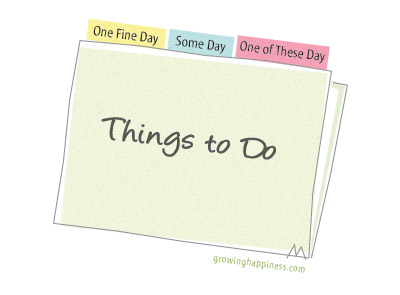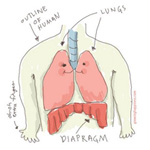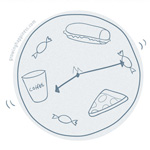Things to Do on a Fine Day
Do you keep a “One Fine Day” list? I do.
It all started when I realised that my husband and I tend to put doing some things off till “one fine day” — see the polar bears at the zoo? Not today, maybe one fine day; one fine day we’ll watch Citizen Kane; today I don’t feel like checking out that new place, maybe another day, when the weather is fine.
I’ve started keeping a list on my computer called “One Fine Day” where I jot down activities we promise to do well, one fine day.

Of course life is best enjoyed without (much) planning but if we’re ever stumped with what to do on a fine, sunny Saturday, there’s always the list to refer to. So far, we’ve not yet find a need to do so but that’s also fine with me!
Useful Things in My Wallet
A Pen and A Measuring Tape
A Mini Wallet Pen
I have a mini stainless steel pen that fits nicely in my wallet (I have a Zebra one which costs about $3). My PalmPilot days probably initiated this habit. The PDA came with a stylus+pen which I used regularly (the pen, not the PDA). I no longer use a PDA, relying solely on my phone’s organiser functions, but there are many benefits to having a pen with you at all times:
- Reduce waiting time Very useful for filling in forms at the bank or contest entries at the supermarket — you don’t have to wait for the counter pens to be free or be faced with pens that run out of ink after writing the first letter.
- Make new friends There will always be someone you who’d want to borrow a pen – at a busy conference, in the plane, etc. Ran out of business cards? Just write your details on a scrap of paper and voila instant business card!
- Never lose an inspired thought The back of my receipts are filled with notes written at the point inspiration struck — ideas for design and writing, thoughts on world domination. I also write down questions to Google later when I’m at my PC.

A Measuring Tape
I also have a measuring tape in my wallet. What kind of tape fits in a wallet? The paper tape measure from Ikea! It’s free, light and can fit in most wallets (you can cut half away to fit smaller wallets). What can you do with it? Let’s see:
- Reduce disagreements and inaccuracies I find it especially useful when needing to communicate the exact size of posters with my clients when I’m called to an out-of-office location. Tip for designers – mark standard paper sizes on the tape, then you’ll never have to guesstimate how wide an A2 sheet is.

- Make new friends Everyone needs to measure something now and then right? But who’d thought of carrying a tape measure with them all the time? Sure, if you’re a real estate agent, otherwise you’re probably be the one of the few people around with a portable ruler. That may earn you a friend or two.
- Never lose the opportunity to experiment Are yard-long beans really 3-feet long? Nope. Are Subway’s Footlong sandwiches exactly 12-inches long? Sometimes. Is your definition of “1 inch” different from the hairdresser’s? Yes.
Apart from the obvious (cash, cards, etc) what interesting or useful things do you have in your wallet?
Escalating Hiccup
Stretching and Other Tried and Tested Ways to Stop Hiccups
I’ve never been excited about getting hiccups before but after receiving so many responses for The Best Cure for Hiccups, I actually look forward to getting one so that I can try some of the reader-suggested methods for stopping this common problem! I I’ve got hiccups three times since.
First Time Lucky
 The first one struck about a month ago, while I was on an escalator at a shopping mall. As I didn’t have a glass of warm water handy, I decided to try one of the “mind over matter” techniques — hiccuping on command. Interestingly, right the hiccups stopped by the time I reached the next floor. It could be one of those short hiccups so I thought I’d wait for another one before blogging about it.
The first one struck about a month ago, while I was on an escalator at a shopping mall. As I didn’t have a glass of warm water handy, I decided to try one of the “mind over matter” techniques — hiccuping on command. Interestingly, right the hiccups stopped by the time I reached the next floor. It could be one of those short hiccups so I thought I’d wait for another one before blogging about it.
![]()
I Bet You Can’t Hiccup When I Tell You To
 The second incident happened last week while I was on an escalator at another shopping centre. I practiced the same thing I did a month ago but this time, it didn’t work.
The second incident happened last week while I was on an escalator at another shopping centre. I practiced the same thing I did a month ago but this time, it didn’t work.
B, who was with me at that time, tried the “fright tactic”, which did nothing to stop the spasming (but I did get a good scare). He then tried the betting as suggested by David (a variant of hiccup on command technique):
“The best cure for hiccups I’ve ever found was introduced to me by my boss. I was hiccuping and he pulled $20 out of his wallet and said, “If you can hiccup again you can have this money.” As soon as I started to concentrate on being able to hiccup they stopped. I now pull this trick on all of my friends, and I’ve never lost the bet!”
Unfortunately, he lost the bet. :P
I am Human, Therefore I Shouldn’t Hiccup?
7 minutes later, it became obvious that it wasn’t going to be a brief episode. I remembered reading the remnants of evolution theory for hiccups. In this hypothesis, it is suggested that these involuntary spasms of the diaphragm are triggered by electric signals generated in the brain stem we inherited from our amphibian ancestors. The proposed cure is to remind ourselves that we’re human. Right… I’m not too sure about the deep-sea culture 500 million years ago, but escalator-riding seems like a very human activity to me, which was what I was doing when I got my hiccup. Still, I had ran out of options so it was worth a shot.
I started thinking about all the things that made me human — surfing the internet, going to the supermarket, cycling at the beach, dining on a seafood buffet…mmm…fish.
Apparently, reminding myself that “I am NOT an amphibian…” was about as helpful as asking people to not think of pink elephants. I had more thoughts about salamanders in that two minutes than in all my school years combined. Needless to say, it didn’t do much to solve my problem (the hiccups only stopped when I was about to get myself a cup of hot tea a few minutes later).
![]()
Temporarily Not Human Again
 The third time happened five days ago while I was going down an escalator at the convention centre. Okay, I wasn’t really riding the escalator, I was descending a flight of temporary stairs but what are the odds of getting another one while being on an escalator!
The third time happened five days ago while I was going down an escalator at the convention centre. Okay, I wasn’t really riding the escalator, I was descending a flight of temporary stairs but what are the odds of getting another one while being on an escalator!
Once again I tried a few of the suggested tips:
- Holding my breath for as long as possible
- Pressing on my eyes while hitting my back
- Gasping a few times in between hiccups
- Swallowing a couple of times before hiccuping
- Twisting my earlobes
Yes, I looked very silly doing all the above, and no, none of them worked.
Stretching It A Little
I was wondering whether there was such a thing as an escalator allergy when the idea of stopping hiccups by stretching came to mind. Some muscle cramps are relieved by stretching so this suggestion seemed like a very valid one.
I didn’t remember exactly how the stretch should be done so I just pulled my left arm at an angle over my head (like this). Only half expecting it to work, I kept that position for about 10 seconds. Nothing happened.
I tried it again with my right arm, this time a little longer and stretching as far as I could. Surprisingly, the hiccups did stop!
![]()
So there you have it, some warm waterless tips tried and tested. It would be too early to say that the stretching method is the cure for hiccups (it’s only been successful with me once) but if it were, it won’t only be the best, it will be the simplest one as well! I am looking forward to my next hiccup to verify whether the result is repeatable.
Escalators, here I come!
Reboiling Points
Boiling Water Multiple Times Not As Harmful to Health As Thought
There was an elderly tea lady (let’s call her Mrs D) at the place I used to work. She wasn’t a tea lady in the traditional sense who’d wheel her trolley of goodies at teatime — she prepared refreshments for our weekly meetings — but she loved observing me while I brew a cuppa in the office pantry, which made me slightly nervous at times.
I was about to make myself a cup of instant coffee one day when I found the electric kettle filled with enough water to make a warm cup of coffee. Because of the ridiculous subarctic temperature of the office, I preferred my coffee tongue-scalding hot so I did what I thought was the obvious thing to do — I turned the kettle back on.
 Already anxious by her mere presence, I was startled silly when Mrs D boomed, “What on earth are you doing?! Why are you boiling the water again? You’re not supposed to do that!”
Already anxious by her mere presence, I was startled silly when Mrs D boomed, “What on earth are you doing?! Why are you boiling the water again? You’re not supposed to do that!”
I told her about my coffee temperature preference but she continued disapprovingly, “but you’re not supposed to reheat water that’s already been boiled!!!” When I tried asking her the reason why she kept saying that I wasn’t supposed to. I asked another colleague who happened to be there and she said the same thing, “you’re not supposed to boil water multiple times because it’s not good for you!!!”
Outnumbered with no desire to argue, I left the scene with a less-than-hot cup of coffee.
Being the naturally curious person that I am, I decided to ask the rest of my colleagues about this. The consensus was nearly unanimous(a few had never heard of it) — you shouldn’t boil water more than once — the reasons were similar – reboiled water is not good. Why exactly? They didn’t have an answer.
I wasn’t convinced and brushed it all aside as old wives’ tales. However, despite my numerous make-coffee-while-no-one-is-around attempts later, I kept forgetting to research the reasons and origins for this theory.
![]()
5 years later
I was at a coffee house while waiting for my camera to be serviced the other day when out of boredom, I decided to read all their coffee and tea leaflets. There was a section devoted to the importance of using fresh water for brewing coffee and tea. I didn’t think much about it until much later when I was making meyself a cup of coffee at home.
Remembering the Water Mystery from half a decade ago, I consulted my friend Google: Reboiled water causes cancer? – not true unless your water is already toxic to begin with. Reboiling causes water to harden? – not true either. Then I found this:
10 Tips for A Better Cup of Tea
The more oxygen that is dissolved in water, the better it tastes. So, to make sure you use water with the maximum amount of oxygen, don’t re-boil any leftover water in your kettle. Water that is boiled too much becomes poorly aerated because oxygen atoms escape in the form of steam. By always filling your kettle up afresh, you are ensured fully aerated and tasty water.”
Ten Tips for a Betta Cuppa-Fresh Water, Best water MSN Encarta
Mystery solved.
Edit: Thanks to the comment by Mihai, I suddenly remembered learning about water aeration in school. Here’s a bit more on that:
“Aerated water is, correctly speaking, distilled water to which purified air is added to improve its flavor. Wikipedia”
My Blog Traffic Generation Story
Techniques I Used to Generate and Increase Web Traffic
I started this blog, in the middle of January 2008 and currently have a readership of more than 3000 a month, a decent number for a blog that just turned 4 months last week. I thought, I’d share how I got here:
JANUARY - Setting A Goal
My goal was to have 3000 readers a month by 15th April 2008.

I had a very strong believe that it was an attainable goal. At that time, I didn’t look into actively promoting my website. I just I thought if my writing and drawings were good enough, my blog traffic would come naturally. I was a naive blogger! :P
![]()
FEBRUARY – Give Some Feedback (And Get Some Back)
In mid-Feb, Growing Happiness turned 1 month old with 3 visitors a day. It felt kinda lonely writing for myself but consoled myself with that fact that the blog is only a month old.

I had a shift in mindset at the end of month. I used to think no one would really care about what I had to say on their blogs but then I thought, “if I wanna hear people’s opinion on my blog, surely these people would want to know what I had to say too”.
I started commenting on other people’s blog regularly (about 5-10 blogs a day). I didn’t consciously pick blogs within my niche, just blogs that I was reading at any given time. If I had something to say that would add value to the blog I’m reading, I’d leave a comment.
![]()
MARCH – Social Networking
By the end of my second month of blogging, I had about 360 readers or about 12 readers a day. At this rate, my goal of 100 a day readership by the next month looked like an arduously uphill task. I decided to be more active in the blogging community in order to make my presence felt.

I joined NaBloPoMo, a community in support of daily blog posting. It was a good way to kick start a daily writing habit. Although I didn’t get a lot of web traffic from there, I did get quite a few visitors coming for my free HTML badges and the WordPress and Blogger tutorials that came with it.
I also became more active in StumbleUpon. I did a lot of stumbling, wrote reviews of sites I enjoyed and made a couple of friends.
![]()
APRIL – Traffic Surge
I joined BlogCatalog a social blog directory and was moderately active in the discussion forums. I made a number of good friends there and, despite my initial resistance, started to enjoy this community thing greatly! The friends I made from BlogCatalog are fantastic. They are probably my most loyal readers and active commentors. Thank you guys! :)
As regular comments started coming in, I became a confident blogger. People reacted to what I wrote and I enjoyed the interaction. My blog traffic improved to about 25 visitors a day in the first week of April. Despite this very modest number, I still held strongly to the believe that I could achieve a 100 a day average readership by my third month (ending 15th April).
On 14th April, the eve of Growing Happiness third month, I had… 18 visitors. It seemed nearly impossible that my traffic would increase to 3000 the next day. However, I chose to be a positive blogger.

On 15th April, my eyes nearly popped out of their sockets when I checked my stats — I got nearly 7500 unique visitors through StumbleUpon overnight for my post “The Best Cure for Hiccups“!. That was about a 400 times increase in visitors to my blog within a single day! However, the traffic died down quickly. Within four days, it went from thousands to about 30 visitors, proving the volatile, unpredictable and non-committal nature of web traffic driven from social bookmarking sites such as StumbleUpon, Digg and Technorati.
A week later the same post got featured on Tipnut which saw my blog traffic jump to the hundreds range. But my winning streak didn’t end there. The week after that, the “how to stop hiccup” article got featured in LifeHacker, seeing my blog traffic jump to the thousands again.
![]()
MAY – Planning for Future Expansion
While I enjoyed BlogCatalog, it took a huge chunk of my time. I decide to limit my participation there to a few times a week to concentrate on writing articles for my blog (and of course, work!)
I joined Doodle Week because doodling is something I enjoy greatly. It was a really fun exercise and I even made a couple of new friends from there.
I also submitted two articles to Blog Carnival, and the post Specify Your Ideal Job Today was selected to be featured on the carnival How To Make Money Doing What You Love at Inspired Moneymaker.

I am on the look out for other ways to expanding my readership so here are some other blog traffic generation methods I may experiment with in the coming months:
Posting Frequency
Damien Riley of Postcard from the Funny Farm (and a friend from BlogCatalog!) suggested, against convention, that posting frequently can result in increased traffic to your blogs.
At the moment, I post about 3 times a week. One of these weeks, when I’m not too busy, I might try posting a few times a day and let you guys know the result. :)
Ades of Adesblog mentioned in his post “Twitter is increasingly becoming one of the top sources of web traffic to many people’s blogs”
Since I will be embarking on an exciting project that would require me to be away from the computer for long periods of time, I’m very keen to explore other ways to keep my readers updated and Twitter seems to be the answer.
![]()
Conclusion
What conclusions about blog traffic generation can I draw from my blogging experience so far?
It takes work – Promote yourself and accept that you need the community.
Being part of a community or network such as BlogCatalog is a great way to make new friends and expand your readership. I’m thankful to have so many friends from the web!
Always be grateful.
Only 3 readers? Those 3 readers are your best friends and cheerleaders. There are millions of blogs out there and they choose to read YOUR blog! That’s a great honour!
A post that addresses a need or attempts to solve a common problem appeals to the masses. The popularity of my “how to stop hiccups” post was due to its timeless, universal appeal — everyone has hiccups now and then and would like to know the easiest, fastest way to stop it. The more timeless, useful posts you have, the more blog traffic you will get. Which is why so many professional bloggers promote the writing of “pillar posts” (See “What are Pillar Articles?” below for explanation).
You need to have patience.
Unless you have a large marketing budget or count a blogging celebrity as your drinking buddy, you have to start from scratch. And it takes time to build something from scratch.
Never underestimate the importance of having goals and the power of positive thinking.
As my experience outlined here show, it is important to have clear goals and remain positive. You’d never know what can happen overnight!
All the best!
What are Pillar Articles?
Pillar articles are not your average blog post. They are comprehensive posts which offer great value to readers and are timeless in nature. The posts are usually longer with well-researched and original content.
Resources
Pillar Posts Definition and Tips on Adesblog
Characteristics of Pillar Articles on Daily Blog Tips
Tutorial: Photos with Rounded Corners using Photoshop

Round/rounded, curved/smooth corner, there are many names for this effect and there are a few methods to create it. In this tutorial, I’m gonna teach you how to get your photos to have rounded corners using what I consider the easiest and most flexible method – using clipping masks.
There are 7 images in this tutorial (totaling 320kb), not including the header image above .








